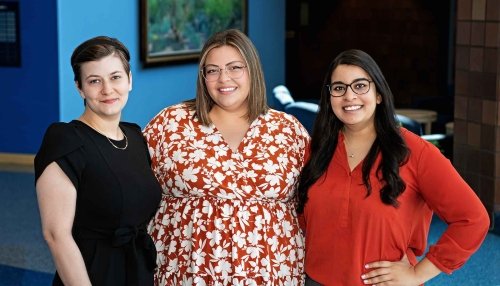The online Master of Public Health (M.P.H.) empowers students to tackle complex public health challenges using a One Health approach that integrates human, animal, and environmental health principles and practices. This interdisciplinary program offers students in healthcare programs and working professionals an opportunity to attain a public health degree.
Program Format
- Dual Degree
- Online delivery, available to students on the Downers Grove and Glendale campuses
- 3.5 to 4 years
- Stand Alone
- Online delivery, available to students anywhere and anytime
- 15 months to 3 years
Interdisciplinary Learning
This interdisciplinary degree program provides opportunities to develop public health knowledge and skills to add value to a healthcare professional degree.
Two Degree Options
The degree is offered as a stand-alone option for health professionals and as a dual-degree option for students enrolled in one of Midwestern’s graduate healthcare degree programs. Students enrolled in the Dual Degree may transfer courses from their healthcare degree program towards the M.P.H. degree, reducing the overall tuition cost and time to completion.
Application Process & Deadline
To be considered for admission to the M.P.H. degree program, applicants must submit their applications online through the Midwestern University direct application.
Dual degrees are completed in conjunction with healthcare professional degrees such as Doctor of Osteopathic Medicine, Doctor of Veterinary Medicine, Doctor of Optometry, or Doctor of Dental Medicine professional degree programs. These students may apply to the M.P.H. program to earn a dual degree by submitting an abbreviated online application through the Student Portal and releasing their Midwestern University application package to the M.P.H. program for admissions consideration. No additional application fee is required.
The M.P.H. degree program uses a rolling admissions process in which completed applications are reviewed and decisions are made at regular intervals during the admissions cycle.
The deadline for applications is April 15 or the first business day thereafter.
Glendale full list of admissions requirements
*Subject to change
Downers Grove full list of admissions requirements
*Subject to change
Learn More
Learn more about the requirements and find quick links to relevant catalog content to guide you in your application process.
- Bachelor’s degree or higher, preferably in the sciences
- Minimum cumulative GPA of 2.75
- Personal statement
- Dual degree applicants may transfer MWU healthcare professional application to M.P.H.
Glendale full list of admissions requirements*
*Subject to change
Downers Grove full list of admissions requirements*
*Subject to change
The Master of Public Health program's mission is to provide public health education for healthcare professionals.
The Midwestern University Master of Public Health program is an interdisciplinary professional degree in public health. The curriculum emphasizes the interconnectedness of health among human, animal, and environmental systems and prepares students to address complex health challenges in a broad range of clinical and public health settings. A student enrolled as a dual degree candidate in any of Midwestern University’s health professional degree programs particularly enhances their medical knowledge, public health skills, and career options upon completion of this program.
The 56 quarter-credit hour program consists of online coursework, an applied public health practicum, and a culminating project. Online coursework provides students with foundational knowledge in epidemiology, biostatistics, environmental health, social and behavioral health, and health policy. The focus on One Health provides students an opportunity to explore the implications and intersections of human, animal, and environmental health by taking coursework focused on each of these One Health domains.
Students in the M.P.H. program will apply what they have learned in courses in a range of public health clinical and research settings, and will complete a culminating project as a part of their public health training. Students pursuing a dual degree will take M.P.H. coursework primarily during the summer quarter, but some courses may be taken during other quarters concurrent with healthcare professional degree program courses.
The M.P.H. degree will help students become more competitive applicants for careers in clinical and public health practice, global health, government service, and more.
- Clinical & public health practice
- Global healthcare teams
- Environmental health
- Food safety
- Biostatistics
- Research
- Epidemiology
- Health services management
- Occupational health and safety
- Government
- Zoonotic disease and vector control
- Female: 86%
- Male: 14%
- Average Age: 25
- Average Overall GPA: 3.57
- Healthcare discipline:
- Doctor of Osteopathic Medicine (D.O.) - 37%
- Doctor of Veterinary Medicine (D.V.M.) - 19%
- Doctor of Dental Medicine (D.M.D.) - 33%
- Doctor of Optometry (O.D.) - 5%
- Other - 6%
- Top "Home" States: Arizona, Illinois
Midwestern University is accredited by The Higher Learning Commission/A Commission of the North Central Association of Colleges and Schools (HLC/NCA), 230 South LaSalle Street, Suite 7-500, Chicago, IL 60604-1413; phone 312-263-0456.
Academic Course Catalog
Explore details regarding your specific College/Program (subject to change).
General Application Questions
Yes! Current or admitted Midwestern University students may submit their MWU healthcare professional application (using a transfer link in the student portal) to the M.P.H. Program for admissions consideration.
On your student portal, use the transfer application link, which allows you to transfer your health professions application to the M.P.H. program for admissions consideration. Additionally, you will be required to submit a personal statement on how the M.P.H. degree fits into your professional goals.
The application window opens on November 1st and admission decisions are made on a rolling basis. Applicants are encouraged to apply early but no later than April 15th.
One Health is the collaborative effort of multiple health science professions, working locally, nationally, and globally-to attain optimal health for people, domestic animals, wildlife, plants, and our environment.
One Health inspires Midwestern University faculty, staff, and students to work collaboratively as an interprofessional team. Midwestern graduates understand the nature and interdependency of humans, animals, and the environment and strengthen their bonds as healthcare professionals through education and research to benefit the health, quality of life, and well-being of all species.
M.P.H. Degree Program Questions
Midwestern University offers an M.P.H. degree. This degree prepares students to tackle increasingly complex public health issues through a One Health approach that integrates human, animal, and environmental health principles and practices.
The M.P.H. degree consists of 56 quarter-credit hours which includes core courses, elective courses, capstone course, and a practicum.
Students enrolled in the Stand-Alone program may transfer up to 10 quarter-credits from equivalent graduate-level coursework completed at other institutions (within the past 10 years) prior to matriculation at Midwestern University. Generally, transfer credit will only be given to students who satisfactorily completed coursework in a CEPH-accredited M.P.H. or an accredited professional healthcare degree program with a minimum letter grade of “B.”
It is estimated that, based on the credit load and online format, each course requires approximately 3 hours of student work per credit hour, per week during a 10-week quarter. This includes reading, virtual lectures, assignments, and assigned online discussion.
A typical summer quarter course load for students is 12-15 credits, equating to approximately 36-45 hours of course work per week. Dual degree students will take most M.P.H. course work during the summer quarters when they are not taking courses in their primary professional program. Some electives, the public health practicum, and the culminating project will be completed concurrently with the third and fourth year clinical rotation schedule.
The dual degree program is designed to allow the transfer of up to 12 credits for approved courses completed in the primary program towards the M.P.H. degree. Typically, students take the M.P.H. degree requirements during two summer quarters and complete the practicum and culminating project during their third or fourth year.
For a list of courses eligible for elective credit in the M.P.H. program, see the Midwestern University course catalog.*
*Subject to change
M.P.H. coursework is generally taken during the summer quarters. Certain courses, the public health practicum and the culminating project are completed during the third and fourth years of the primary program. Refer to the Midwestern course catalog for a sample course sequence.
The M.P.H. Program Specialist will be assigned as the academic advisor to assist students with academic concerns and program completion. Faculty and staff are available for professional advising.
In addition to the faculty advisor, the Program Director, College of Graduate Studies Dean, Associate Deans, and the Dean of Students are available to assist students. Students will be able to choose additional faculty to work with for their culminating project.
The public health practicum is a planned, supervised, and evaluated practice experience that students complete later in the M.P.H. program. It is an opportunity for students to participate in experiential training in public health within healthcare settings and government-sponsored organizations.
Students can expect to devote approximately 160 hours to the practicum and will produce two work products, such as a written assignment, multimedia presentation, public health educational material, etc. Example practicum sites include local and state health departments in the local geographic area or other more distant sites.
The Office of Student Financial Services can advise on the cost of attendance, financial aid options, and other questions related to attendance. Refer to the Paying for College pages for additional information.
The Midwestern University Library offers a variety of resources for students including many e-books for public health. Desk copies of required textbooks are also available in the reserved section of the libraries on both the Downers Grove, IL and Glendale, AZ campuses.
Many of the required textbooks are also available at the library as e-books. Some allow for unlimited users while others are limited to one user at a time. See the Midwestern library website for further details.
Students enrolled in online courses are expected to have consistent access to a computer that is connected to reliable internet, installed with a word processing and a presentation program (e.g., Microsoft Office, Mac Pages/Keynote), and equipped with a microphone, speakers, and webcam.
The biostatistics courses in the M.P.H. Program utilize the SAS University Edition statistical software package. This software is available for download at no charge to students.
Hear our Stories
Sydnie Taylor, College of Dental Medicine-Illinois, Master of Public Health, Class of 2026
“When choosing a healthcare career, I was excited for the opportunity to provide dignified care, accessibility, and advocacy to people who come from communities like mine as well as inspiring communities to take charge of their health and break down barriers to care.”

Tiffany Hughes, Ph.D., M.P.H., M.B.A., Assistant Professor, Master of Public Health Program, College of Graduate Studies–Glendale
“The benefit of going through the Master’s of Public Health Program, especially for dual degree students, is that it really helps complement the primary profession.”


